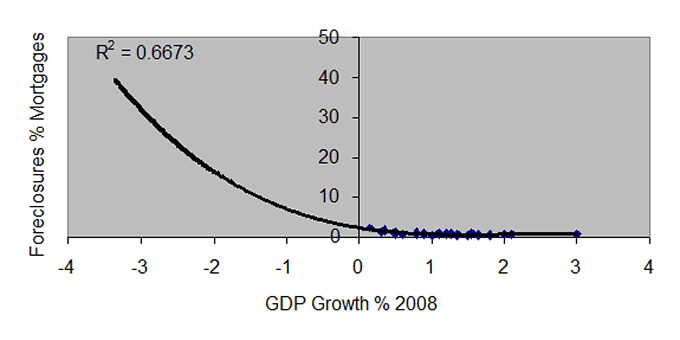Nouriel Roubini 2009 U.S. GDP Forecasting 40% Home Mortgage Failures?
Housing-Market / US Housing Jan 08, 2009 - 12:52 PM GMTBy: Andrew_Butter

 IF Nouriel Roubini's 2009 GDP forecast for USA is right, THEN could 40% of home mortgages fail? It's been a long time since I saw two guys so eager to lose their jobs, Hank Paulson and George Bush could hardly be held back, they were positively skipping out of the door; I wonder why?
IF Nouriel Roubini's 2009 GDP forecast for USA is right, THEN could 40% of home mortgages fail? It's been a long time since I saw two guys so eager to lose their jobs, Hank Paulson and George Bush could hardly be held back, they were positively skipping out of the door; I wonder why?
 Last week Dr. Nouriel Roubini's newsletter (RGE Monitor) predicted a peak to trough in US housing of 38% to 44% with a bottom not before mid 2010.
Last week Dr. Nouriel Roubini's newsletter (RGE Monitor) predicted a peak to trough in US housing of 38% to 44% with a bottom not before mid 2010.
That's the first time I saw Roubini put a number on house prices. My projection three months ago said (low-case) peak to trough 32% with a bottom mid 2010 ( Fixing the U.S. Housing Market and House Prices).
So "SNAP!" - more or less.
But my projection of 32% was based on 3% nominal GDP growth in 2009 (I don't do GDP I just do real estate prices, I look up the GDP projections), but things are looking worse now. Of course Roubini is the most pessimistic, that's why they call him "Dr. Doom".
If Roubini is right in that nominal GDP growth will be -5.4% in 2009 (-3.4% real and -2% inflation) then my model says that house-prices will fall 15% in 2009 (peak to end of 2009 = 35%).
What happens in 2010 will depend on the economy, and no one is talking about that. Roubini hints that the recession could be over by 2010; so for the sake of argument let's say 2% nominal GDP growth in 2010 (what's real and what's inflation doesn't matter for my model).
In that case my model says the bottom will be some time after mid 2010 with a total peak to trough of 40%. That's all assuming that long-term interest rates stay low.
So "SNAP!" and " SNAP!"... using Roubini's numbers for the economy my model delivers mid-range of his projection. Time for mutual admiration perhaps?
Methodology
RGE don't explain their methodology so it's hard to say if that's two independent views or the same model done twice.
Just for the record, the core of my model is a valuation and in any coherent valuation you are obliged to explain the methodology (I do).
That's unless you are using Zimbabwe Valuation Standards, or the "Bean Counter's Big Surprise Valuation Standards" mandated under US GAAP and IFRS. But then RGE's price forecast is an "economic" prediction, and for that, well apparently, anything goes.
I can't help wondering if the current mess might have something to do with economists (and bean counters) thinking they have the inside edge on doing valuations for assessing capital adequacy of banks with debt secured by real estate? Isn't that a bit like hiring an (expensive) dentist to clean your drains?
Nah...can't be that, Allan Greenspan is a genius and a GREAT ECONOMIST, I know that because he said so himself.
And if you can't understand that "froth" means the "biggest property bubble in history" you should be working minimum wage as a security guard, if you can get a job at all!
Anyway, back to the point, I suspect we are independent since RGE's logic appears to be based on inventory (housing starts and foreclosures) and uptake. My model ( Value of Housing Markets in USA and UK Past, Present, and Future) is based on International Valuation Standards and 100+ years of data and does not need to know anything about starts, foreclosures, or sales; rather these are predicted by the model.
It's an important distinction, if price is affected by starts, foreclosures, and sales then the logical strategy to "rescue" house prices (and the bonds that depend on them - i.e. fix the mess), is to cut starts and foreclosures and to encourage sales by getting Fannie and Freddie to lend irresponsibly.
Or in the words of that Great American Poet..."do it to me one more time...BABY". That appears, at least to the untrained observer, to be the current strategy.
But the valuation model says "NO, that won't do anything to prices".
For the valuation model, price is independent of starts, foreclosures or sales, in fact it's price that drives those variable, and that's driven by nominal GDP, long-term interest rates and the inevitability of Farrell's Rule with the only possible way out of the loop being to implement "Surprise-Free Valuation Standards" (as was argued in UK Housing Market Will Not Bottom Before 2012) .
Not that there is anything wrong with economic theories, just they often confuses cause with effect which has the tendency to send people in the wrong direction, like when Allan Greenspan pushed down interest rates so that we could all enjoy a "bit of froth". And very tasty froth it was too! Thanks Allan.
Here's why:
Logically price drives starts (I've done development, you don't start when prices are in a hole unless you have a theory and an inside track to a banker (preferably a bent one), that much I know).
So I think it's safe to assume that the logic in RGE's argument is that if starts are falling then the market knows something. Well no contest there; I say price drives starts too; just I get to starts via price rather than the other way around...cause and effect.
You can say what you like about foreclosures but my view is that they are driven by either price or GDP (which in turn drives my model - i.e. there could be cross correlation), and that if foreclosures are to some extent, driving price down (the conventional wisdom amongst economists), then the effect is part of a feedback loop ( The U.S. Housing Market Economic Double Negative Feedback Loop) .
Sure sales can be driven by irresponsible lending, but only if the trajectory of price is upwards ( Time for Selective Buying of Mortgaged Backed Securities?) .
Now the trajectory is down, that's a different ball game. Sure also, constraints on lending slow sales, but the valuation model seems to suggest this doesn't do anything to price when prices are falling (people just don't move).
It's a small point but what that says is that bailing out distressed mortgages and getting Fannie and Freddie to be irresponsible again won't affect prices, but it might affect GDP in the long term (negatively).
Predicting Foreclosures
In October I put up a chart based on combining some data that I found on the FT website on foreclosures by State, with some other data I trawled up on GDP growth by State.
I thought it might help resolve the point about foreclosures. This showed that there was a relationship between foreclosures (by State) and GDP growth per State (65% R-Squared or so). ( The U.S. Housing Market Economic Double Negative Feedback Loop) .
Basically foreclosures shoot up when GDP growth goes down below 1%. If average GDP growth goes down to -3.4% (real) it looks like we may be having the fun of accelerating foreclosures some time soon (which, now that GDP has started to tank, seems to be happening - ummm....could the two be related?)
So cause and effect, either (a) falling GDP drives foreclosures (b) foreclosures drive GDP down (c) there is a feedback loop or (d) foreclosures and GDP are independent and a 65% R-Squared is just a chance occurrence?
My view is (a) with a bit of (c).
So by how much?
Well I know that you are not "supposed" to project outside the data, but just for a bit of fun I tracked back the best fit regression line to minus 3.4% GDP Growth.

Umm...oh dear I hope either the regression line that predicts foreclosures from GDP or GDP from foreclosures (or a bit of both) doesn't mean that at minus 3.4% GDP foreclosures will pop up to 40%.
Or if that's the story I hope that Nouriel Roubini is wrong about his GDP projections!
He's been wrong before, he must have been; he's an economist after all! Didn't he say the crunch would happen before 2005, in which case perhaps his -3.4% GDP growth won't happen before 2012...whew!!!
But maybe not...oh dear oh dear, and just for a bit of froth! There again it's non-recourse debt so all those people pushed into negative equity can just jingle their way out of the hole. Thank God for that! Oh but oops…I almost forgot, what about the securities?
Don't worry we will get the Chinese and the SWF's to bail us out, no problem! And if that fails there is always the grandchildren.
Right now house prices in USA are under-valued (below the long-term equilibrium line), but unless there is REAL CHANGE they will keep going down as increasingly jingle-mail becomes the only option.
 So HAPPY TIMES... 40% to 44% peak to trough and (perhaps) 40% foreclosure on home mortgages, here we come!
So HAPPY TIMES... 40% to 44% peak to trough and (perhaps) 40% foreclosure on home mortgages, here we come!
Yup I think that Cowboy George deserves a long rest, and although the new guy is possibly the first US President in a long time that anyone felt like dancing in the streets about, I must say, last time I saw him on TV he did seem to have a look like "darn...what have I let myself in for?"
It's one thing to run a brilliant election campaign; it's another to run the can of worms that the US Government has evolved into.
The numbers on inflation, the real size of the government's liabilities, and the "efficiency" with which money is funneled out of the back door to special interests; these are all manipulated by a shadowy tribe of vampires. And the hastily concocted "Stimulus Plan" just plays into their hands.
Right now there is only one number in USA that the manipulators of power can't (presently) get their hands on. That's how much people will pay for a house in a free and open market.
For years Fannie and Freddie distorted that number (they were set up so people could afford to own homes, their effect was to radically increase the price of housing – figure that one out), but eventually that proved to be an unsustainable scam. Ask the Master Scammer Mr. Madof, he knows, eventually every scam runs out of money.
Fannie and Freddie "temporarily" ran out of money, sure they were dressed up as instruments of the Free Market, maybe before 1987 when they changed the accounting rules for measuring inflation they were, but from that point they became instruments of crony capitalism that sucked all the blood out of America.
If CHANGE is really the objective then in Washington nothing changes, the words are the same, "FOLLOW THE MONEY". And make sure it's counted properly.
Forget about US GAAP and IFRS, there is only one tool that properly values assets and liabilities, a silver stake that can tear out the heart of the vampires.
It's called International Valuation Standards.
IF you really want "CHANGE", THEN use that tool.
By Andrew Butter
Andrew Butter is managing partner of ABMC, an investment advisory firm, based in Dubai ( hbutter@eim.ae ), that he setup in 1999, and is has been involved advising on large scale real estate investments, mainly in Dubai.
Copyright © 2009 Andrew Butter
Andrew Butter Archive |
© 2005-2022 http://www.MarketOracle.co.uk - The Market Oracle is a FREE Daily Financial Markets Analysis & Forecasting online publication.


